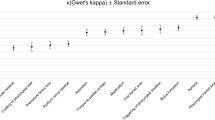Abstract
The Dysphagia Outcome and Severity Scale (DOSS) is widely used to measure dysphagia severity based on videofluoroscopy (VFSS). This study investigated inter-rater reliability (IRR) of the DOSS. It also determined the effect of clinical experience, VFSS audio-recording and training on DOSS IRR. A quantitative prospective research design was used. Seventeen speech and language pathologists (SLPs) were recruited from an acute teaching hospital, Dublin (> 3 years’ VFSS experience, n = 10) and from a postgraduate dysphagia programme in a university setting (< 3 years’ VFSS experience; n = 7). During testing, participants viewed eight VFSS clips (5 with audio-recording). Each VFSS clip was independently rated using the DOSS scale. Four weeks later, the less experienced group attended a 1-h training session on DOSS rating after which DOSS IRR was re-tested. Cohen’s kappa co-efficient was used to establish IRR. IRR of the DOSS presented only fair agreement (κ = 0.36, p < 0.05). DOSS IRR was significantly higher (κ = 0.342) within the more experienced SLP group, compared to the less experienced SLP group (κ = 0.298) (p < 0.05). DOSS IRR was significantly higher in VFSS clips with audio-recording (κ = 0.287) compared to VFSS clips without audio-recording (κ = − 0.0395) (p < 0.05). IRR of the DOSS pre-training (κ = 0.328) was significantly better comparing to post-training (κ = 0.218) (p < 0.05). Findings raise concerns as the DOSS is frequently used in clinical practice to capture dysphagia severity and to monitor changes.

Similar content being viewed by others
References
O’Neil KH, Purdy M, Falk J, Gallo L. The dysphagia outcome and severity scale. Dysphagia. 1999;14(3):139–45.
Butler SG, Markley L, Sanders B, Stuart A. Reliability of the penetration aspiration scale with flexible endoscopic evaluation of swallowing. Ann Otol Rhinol Laryngol. 2015;124(6):480–3.
Wong CK. Interrater reliability of the Berg Balance Scale when used by clinicians of various experience levels to assess people with lower limb amputations. Phys Ther. 2014;94(3):371–8.
Meyer BC, Lyden PD. The modified National Institutes of Health Stroke Scale: its time has come. Int J Stroke. 2009;4(4):267–73.
Quinn TJ, Lees KR, Hardemark HG, Dawson J, Walters MR. Initial experience of a digital training resource for modified Rankin scale assessment in clinical trials. Stroke. 2007;38(8):2257–61.
Støre-Valen J, Ryum T, Pedersen GA, Pripp AH, Jose PE, Karterud S. Does a web-based feedback training program result in improved reliability in clinicians’ ratings of the Global Assessment of Functioning (GAF) Scale? Psychol Assess. 2015;27(3):865.
Byrne MK, Deane FP, Murugesan G, Connaughton E. Interrater reliability of the Observer Rating of Medication Taking scale in an inpatient mental health facility. Int J Ment Health Nurs. 2014;23(6):498–505.
Martin-Harris B, Brodsky MB, Michel Y, Castell DO, Schleicher M, Sandidge J, Blair J. MBS measurement tool for swallow impairment—MBSImp: establishing a standard. Dysphagia. 2008;23(4):392–405.
Royal College of Speech and Language Therapists (RCSLT) (2007) Videofluoroscopic evaluation of oropharyngeal swallowing disorders (VFS) in adults: the role of Speech and Language Therapists. RCSLT Policy Statement. Retrieved from https://www.rcslt.org/docs/freepub/VFS_policy_statement_January_2007.pdf.
Author information
Authors and Affiliations
Corresponding author
Ethics declarations
Conflict of interest
The authors declare that there is no conflict of interest.
Rights and permissions
About this article
Cite this article
Zarkada, A., Regan, J. Inter-rater Reliability of the Dysphagia Outcome and Severity Scale (DOSS): Effects of Clinical Experience, Audio-Recording and Training. Dysphagia 33, 329–336 (2018). https://doi.org/10.1007/s00455-017-9857-4
Received:
Accepted:
Published:
Issue Date:
DOI: https://doi.org/10.1007/s00455-017-9857-4




